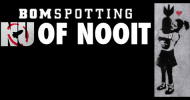De onderstaande tekst stond in mijn eerste leerboek sociologie, Eli Chinoy's Society. Na enige verdere studie op allerlei terreinen kom je er achter dat niet alle herkomstvermeldingen kloppen - het decimale stelsel bijvoorbeeld is zeker niet Grieks. Maar de bedoeling is duidelijk.
"There can be no question about the average American's Americanism or his desire to preserve this precious heritage at all costs. Nevertheless, some insidious foreign ideas have already wormed their way into his civilization without his realizing what was going on. Thus, dawn finds the unsuspecting patriot garbed in pajamas, a garment of East Indian origin; and lying in a bed built on a pattern which originated in either Persia or Asia Minor. He is muffled to the ears in un-American materials: cotton, first domesticated in India; linen, domesticated in the Middle East; wool from an animal native to Asia Minor; or silk whose uses were first discovered by the Chinese.
On awakening he glances at the clock, a medieval European invention, rises in haste, and goes to the bathroom. Here, if he stops to think about it, he must feel himself in the presence of a great American institution; he will have heard stories of both the quality and frequency of foreign plumbing and will know that in no other country does the average man or woman perform their ablutions in the midst of such splendor. But the insidious foreign influences pursue him even here. Glass was invented by the ancient Egyptians, the use of glazed tiles for floors and walls in the Middle East, porcelain in China, and the art of enameling on metal by Mediterranean artisans of the Bronze Age. Even his bathtub and toilet are but slightly modified copies of Roman originals. The only purely American contribution to the ensemble is the steam radiator, against which our patriot very briefly and unintentionally places his posterior.
Returning to the bedroom, the unconscious victim of un-American practices removes his clothes from a chair, invented in the Near East, and proceeds to dress. He puts on close-fitting tailored garments whose form derives from the skin clothing of the ancient nomads of the Asiatic steppes and fastens them with buttons whose prototypes appeared in Europe at the close of the Stone Age. He puts on his feet stiff coverings made from hide prepared by a process invented in ancient Egypt and cut to a pattern which can be traced back to ancient Greece and makes sure they are properly polished, also a Greek idea. Lastly, he ties about his neck a strip of bright-colored cloth, which is a vestigial survival of the shoulder shawls worn by seventeenth-century Croats. He gives himself a final appraisal in the mirror, an old Mediterranean invention and goes downstairs to breakfast.
Here a whole new series of foreign things confront him. His food and drink are placed before him in pottery vessels, the popular name of which - china - is sufficient evidence of their origin. His fork is a medieval Italian invention and his spoon a copy of a Roman original. He will usually begin his meal with coffee, an Abyssinian plant first discovered by Arabs. The American is quite likely to need it to dispel the morning after affects of over-indulgence in fermented drinks, invented in the Near East; or distilled ones, invented by the alchemists of medieval Europe.
If our patriot is old-fashioned enough to adhere to the so-called American breakfast, his coffee will be accompanied by an orange, or orange juice, domesticated in the Mediterranean region, a cantaloupe domesticated in Persia, or grapes domesticated in Asia Minor. From this he will go on to waffles, a Scandinavian invention, with plenty of butter, originally a Near-Eastern cosmetic.
Breakfast over, he sprints for his train - the train, not the sprinting, being an English invention. At the station, he pauses for a moment to buy a newspaper, paying for it with coins invented in ancient Lydia. Once on the train he settles back to inhale the fumes of a cigarette invented in Mexico, or a cigar invented in Brazil. Meanwhile, he reads the news of the day, imprinted in characters invented by the ancient Semites by a process invented in Germany upon a material invented in China. As he scans the latest editorial pointing out the dire results to our institutions of accepting foreign ideas, he will not fail to thank a Hebrew God in an Indo-European language that he is one hundred percent (decimal system invented by the Greeks) American (from Americus Vespucci, Italian geographer)."
by noted anthropologist Ralph Linton
The American Century vol. 40, 1937
Variant die bij de huidige crisis hoort- rondzendmail:
Joe Smith started the day early having set his alarm
clock (MADE IN JAPAN) for 6am. While his coffeepot
(MADE IN CHINA) was perking, he shaved with his
electric razor (MADE IN HONG KONG). He put on a dress
shirt (MADE IN SRI LANKA), designer jeans (MADE IN
SINGAPORE) and tennis shoes (MADE IN KOREA). After
cooking his breakfast in his new electric skillet
(MADE IN INDIA) he sat down with his calculator (MADE
IN MEXICO) to see how much he could spend today. After
setting his watch (MADE IN TAIWAN) to the radio (MADE
IN INDIA) he got in his car (MADE IN GERMANY) filled
it with GAS from Saudi Arabia and continued his search
for a good paying AMERICAN JOB. At the end of yet
another discouraging and fruitless day checking his
Computer (Made In Malaysia), Joe decided to relax for
a while. He put on his sandals (MADE IN BRAZIL) poured
himself a glass of wine (MADE IN FRANCE) and turned on
his TV (MADE IN INDONESIA), and then wondered why he
can't find a good paying job in.AMERICA......
Abonneren op:
Reacties posten (Atom)



Geen opmerkingen:
Een reactie posten